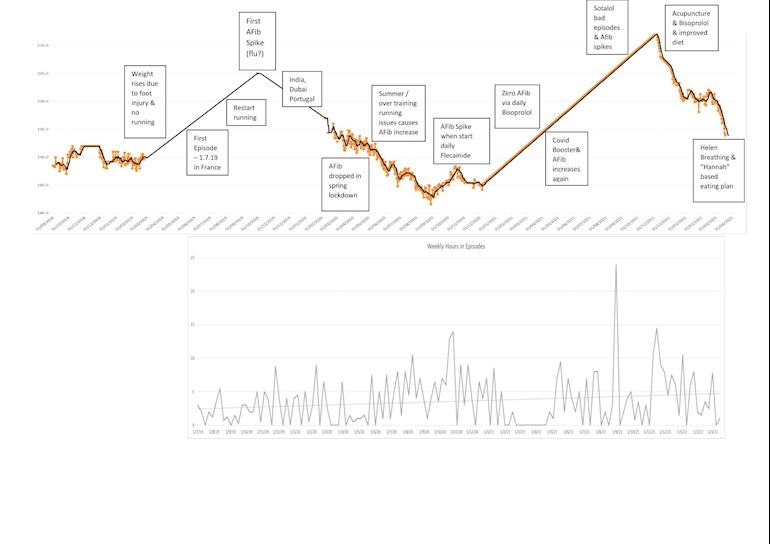All, I really wanted to share this...
Recently have had cause to think more about something that I have been vaguely contemplating for a while, which is to compare my detailed weight history stats with my AFib history stats.
I believe that the result is quite extraordinary and is summarised on the attached graphic.
The top graph is the daily weight in lbs (note some long periods when I wasn't weighing myself, so I have assumed a linear increase to known weights, hence some straight lines).
The bottom graph is my weekly hours in AFib episodes for the same period (July 19 to Date)
I think the correlation is amazing and there seems to be a "critical weight "threshold" when I go above or below somewhere between 195 - 200 lbs and then a "really bad weight" when I get to more like 205-210lbs.
- my first episode ever happened when I hit 200lbs for the first time ever in my life in July 2019
- frequency of episodes drops to zero or close to zero when my weight goes under 195 (coincidentally it has happened 3 times in the spring...) unless I am stupid and (say) run too much and too hard (back when I could still run  )
)
- of my three really bad peaks in episode frequency, two have happened at over 205lbs (coincidentally around November 19 and November 21) and the third was purely medication (tried daily Flecainide...) induced (although coincidentally in November 2020!)
It's not the whole story, but it looks like a big part.
Please let me know what you think!

 ) The rest of what you say certainly resonates. On the breathing side, my acupuncturist is also an experienced yoga teacher and we have only had one session on breath work so far, but it has really made a difference already, specifically in stopping a number of situations with ectopics developing into full blown episodes as they would normally do. Coincidentally my second session is this afternoon!
) The rest of what you say certainly resonates. On the breathing side, my acupuncturist is also an experienced yoga teacher and we have only had one session on breath work so far, but it has really made a difference already, specifically in stopping a number of situations with ectopics developing into full blown episodes as they would normally do. Coincidentally my second session is this afternoon!